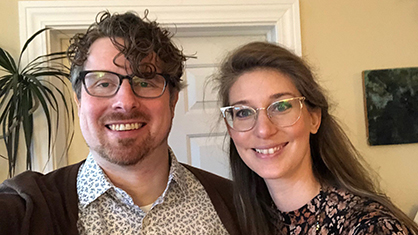Staff Profile: Daniel Schneider, Manager of Research Analytics
Daniel Schneider spends most of his workday doing exactly what many researchers try to avoid: dealing with the multitude of challenges surrounding data extraction. As manager of research analytics for the Northwestern Medicine Enterprise Data Warehouse (NMEDW), Schneider finds joy in helping colleagues track down data from deep within the NMEDW. He’s also adept at discovering ways to make data analysis smoother and more efficient for everyone.
Research and a love of Chicagoland are engrained in Schneider. Having grown up in the Southwest suburbs, he later attended the University of Illinois in Champaign, where Schneider earned his bachelor’s degree in Biology with an emphasis in Molecular Genetics. He began his professional career at the University of Chicago Department of Human Genetics, working to discover genes associated with pulmonary and cardiovascular diseases, including asthma. Schneider fondly recalls his time in this “wet lab” environment, where he was able to perform hands-on experiments with DNA and other molecular fragments.
The work he was doing eventually migrated towards computer programming and developing code to predict various genetic sequences throughout the human genome. Schneider’s decision to attend graduate school at Northwestern to earn his master’s degree in Computational Biology and Informatics was a logical next step as he pursued a career in data analysis.
While earning his master’s degree, Schneider spent time working with the Dictybase group to predict potential novel genes in unidentified regions of the genome. During his time with the group, he had the chance to meet Eric Just, the NMEDW manager of research analytics at the time. Just offered him a role as a data analyst for the NMEDW early in the database’s existence, and the rest is history.
Now that he’s manager of analytics, Schneider spends most of his time managing his team’s projects and assisting researchers on their quests to ethically attain data from various sources, ranging from simple Structured Query Language data to advanced data visualizations. “We currently have close to 150 different source systems flowing into the NMEDW from large scale Electronic Medical Record systems to ancillary tumor registries and redcap projects that are curated by specific labs or departments,” Schneider explains of the database’s extensive size.
But his work isn’t all medical records and buzzwords. Schneider has experienced numerous interesting requests from researchers seeking specific data, and he says his favorite exchange has been multiple researchers asking for copies of all of the data in the database, seemingly not realizing that NMEDW downloads more than 2.8 billion new data elements daily.
Looking to the future, Schneider has several projects in the works, including an effort with the Successful Clinical Response in Pneumonia Therapy (SCRIPT) study, which seeks to examine the complex interactions between alveolar hosts and pathogens that lead to unsuccessful response to therapy in serious pneumonia. This project is even more vital during the current pandemic, given the impact of Covid-19 on lung health.
The opportunity that excites Schneider more than anything, though, is the continued merger of genomic data and how it relates to outcomes detailed in the medical record. “I came to this organization close to 10 years ago with the dream that we would be able to seamlessly analyze both our medical record data as well as genetic sequence in parallel, and although this merger has not progressed as quickly as I would have liked, I am actively involved with many different projects that have the potential to move this process forward,” he says.
His ultimate goal is to be involved in a project that would allow patients to securely access and analyze their own genomic and medical health data in a format that is easy to understand and something that they are allowed to interact with in any way they want on their own.
Data analysis isn’t Schneider’s only talent: he has also been a professional musician for almost two decades. He’s been featured in several records and has even gone on tour across the United States and Europe. When he isn’t spending time researching or making music, he enjoys exploring the great outdoors and finding new places to hike.
But what does Schneider find most valuable about his job? It isn’t the wide range of data at his fingertips or the projects he’s been working on. “I have to acknowledge the amazing team and coworkers I get to interact with on a daily basis,” Schneider says. “They are the reason I come into work every day and they amaze me in different ways constantly. I wouldn’t have been able to accomplish any of the amazing things over the years without their hard work and dedication.”
Written by Morgan Frost






